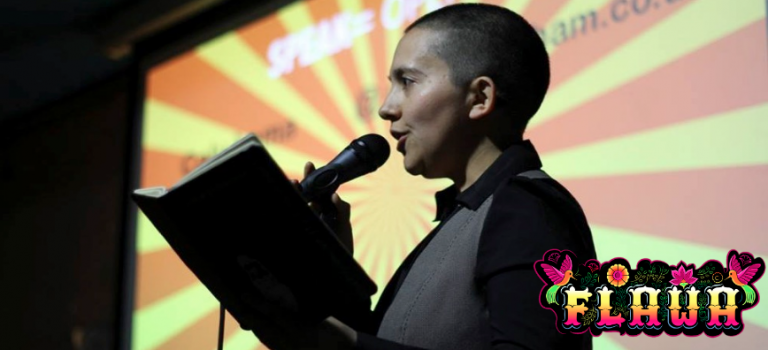
Meet the Inspiring Poets of London’s Upcoming FLAWA Festival
02 May, 2019As part of the first Festival of Latin American Women in Arts (FLAWA), a night of Latinx poetry will showcase some of the many female poetic voices in London, from a wealth of countries and with myriad stories to tell. Organised by Literary South, Latinx Poetry Night will bring live performances from eight Latinx poets, followed by an open mic session where anyone can take the floor and perform.
Prior to the poets taking to the stage, Sonia Quintero, a Colombian poet and artist who runs Newham Poetry Group, will also head a poetry workshop. Sonia told Newham Life: “I don’t teach how to write poetry, I just try to inspire people to read and write and give them the space to express themselves in any way they feel comfortable.”
For all those planning their festival visit, we want to introduce you to some of the powerhouse poets Literary South have brought together for FLAWA’s Latinx Poetry Night on 18th May.
Meet The Poets
 Name
Name
My name is Denisse Vargas Bolaños
City of origin
I was born in La Paz and grew up in Oruro (Bolivia).
How would you describe your writing and performance style?
It is exploratory: I write to understand my inner world, my desires, fears, prejudices and limitations. I also write to question things in society like the role of women in history and the effects of a toxic system that creates polarisation in our relationships to each other and to the planet. I write to understand my roots and my history.
When did you begin writing poetry and why?
I must have been 8 years old when I found a book in my mum’s bookcase that described Freud’s Free Association technique, that consists in writing words or sentences that come to mind. I did it as a game and I liked the feeling of ‘emptying’ myself on a page. I carried on writing when I was a teenager listening to songs in English and creating my own versions in Spanish.
“I liked the feeling of ‘emptying’ myself on a page.”
What inspires you to write?
Everything and anything. It could be something I read in the news or a line in a poem / novel / short story, a personal feeling in a given situation, a song, a landscape, memories, a phrase or a word someone said. Rather than inspiration I call them starting points that help me to connect and shape an idea. As someone said: “all the ideas that come to your mind are like sand you throw into a box so you can later create/ shape something”.
How has living in London/the UK affected your writing and your career?
Being in London has given me the amazing opportunity to connect with many talented and diverse people who have enriched my writing and have widened my perspective of the world in different ways.
I belong to two collectives: SLAP- Spanish & Latin American Poets & Writers – and Hispano American Women Writers on Memory – now Las Juanas. We share our work among ourselves and perform it too. I enjoy the process of preparing for a performance particularly with Las Juanas. They are talented, committed women from whom I have been learning not only about writing but about solidarity and connection. I was also part of ‘The Invisible Presence’, a brilliant mentoring project created to develop and nurture the work of British Latino poets and writers in the UK.
Being part of these groups and living in London has changed the way I approach writing. I see it now as a craft in which you have to invest time and effort. A constant learning process while you are enjoying the ride.
AWAKE
by Denisse Vargas Bolaños
he said it’s just a word,
a language thing,
it doesn’t matter,
he didn’t trace
the pounding,
her vigilant steps
he said it’s just a word
a simple thing,
it doesn’t matter,
he didn’t feel
the layers,
her frozen skin
he said it’s just a word
a random thing,
it doesn’t matter,
he couldn’t see
the guilt, her green hips
trying to contain the spring
he said it’s just a word
a customary thing,
it doesn’t matter,
he couldn’t sense
the spark,
her ancient fire
he said it’s just a word
it doesn’t matter
‘you should get back to sleep’
he didn’t hear
the thunder,
She was awake.
 Name
Name
Calu Lema
City of origin
Born near London and raised in Colombia. My blood states I’m Colombian, my passport says I’m British.
How would you describe your writing and performance style?
My writing comes from my body, a body of a gender-fierce latinx activist decolonising their identity; stripping away (sometimes literally) what doesn’t feel authentic. My style has a sense of agency; I don’t write just to be heard, I write to spark discomfort, inadequacy, doubt. For me poetry is not a form of entertainment; it’s a protest, a call to action, part of dismantling what has never served us.
When did you begin writing poetry and why?
I began writing and performing poetry in high school after joining the poetry group. I realised poetry was a very special way to process my feelings and share where I was emotionally without necessarily going into details. I felt deeply touched by the writings of famous poets and their subversive role in confronting the status quo (mainstream ideologies, dictatorships, heteronormativity, patriarchy, etc).
“For me poetry is not a form of entertainment; it’s a protest, a call to action, part of dismantling what has never served us.”
What inspires you to write?
Imaginary (toxic) romantic love was one of my first sources of inspiration. Deconstructing romantic love is one of the many concepts that inspires me together with Injustice, oppression, exploitation, ignorance, unseen / unchallenged privilege, colonised narratives. Gender and sexual diversity is another topic I feel extremely passionate about and it’s more present in my latest work.
How has living in London/the UK affected your writing and your career?
In my urge to adapt to the culture I stopped nurturing certain aspects of my identity. These “silenced selves” are currently bursting out with rage through my words. As shared in one of my poems “it had colonised my mind with lines that weren’t mine”. Living and existing in “la frontera” is juggling with our layers of identity; is finding and losing hope in an ongoing game of belonging. The time I spent growing up in Colombia deeply shaped me. I’m on a journey back to my roots.
What have we become [excerpt]
by Calu Lema
“Let’s start unbecoming
with our words,
unlearning the scripts,
undoing the pain”.
Roar [excerpt]
by Calu Lema
“Let’s roar from our bones
that so many aches have felt
as our bodies were torn apart
as we prayed as we knelt”.
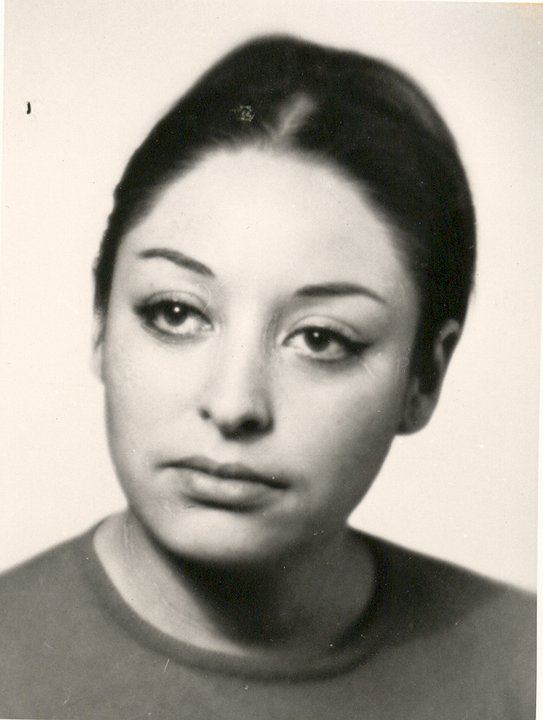 Name
Name
Maria Eugenia del Carmen Bravo Calderara.
(My full name is rather long and embarrassing to say in full in this country where the culture is to try to speak everything with very short words.)
City of origin
I was born in Santiago, Chile, into a middle class family in 1940 and probably this makes me the oldest poet to appear in the festival. I will be 80 next year.
I came to England as an exile after I was made a political prisoner, tortured and imprisoned for nine months. First I went to Switzerland to recover my writings which held there after leaving Chile in diplomatic luggage. Then I came to England.
When did you begin writing poetry and why?
I started writing poetry and prose when I was 8 years old. I always wanted to be a writer. I won a few prizes at school but I lacked security in myself. So when I wrote I did it mostly for myself. There were no mentors to encourage me to publish. But I wrote through the years, including when I was made a prisoner and was sent to a concentration camp. I was even at the National Stadium in Santiago. I decided that I had to write to tell what I was witnessing. Poetry was the best vessel at that time. Poems can be short – condensed- and you can memorise them. You’d be very lucky to put something down on paper in a place where people are tortured and murdered.
“One day I was made a political prisoner, tortured and imprisoned for 9 months. I had to leave Chile and I came to England as an exile, or as they say here as a refugee.”
How you would describe your writing and performance style?
My poetry is very direct and clear. What it makes it striking, I believe, is the connection between the ideas and the emotion. I do not like cerebral poetry. I prefer poetry directly connected to the heart.
My performance is old style. I try to read these complex ideas coloured by emotion the best that I can. You paint a picture with colours. In poetry, colour is pigmented by emotions. I feel.
“Poems can be short – condensed- and you can memorise them. You’d be very lucky to put something down on paper in a place where people are tortured and murdered.”
How has living in London affected your writing?
For me, London/UK has been the best thing that could ever happen to me. In this country I became a real poet and writer. I have been able to publish my work – my poems have been published in magazines and anthologies and have been translated into all major European languages – even some of my poems have been published in Tamil and Arabic. I’ve done poetry readings, the BBC has invited me to talk about my poetry, my voice has been published next to a Guardian article on Mandela’s life in prison – there I was with a poem about those who have been imprisoned for their political ideas, who know the horror of torture, known the way to hell and also by contrast the way to paradise.
‘Ode to England’s Daffodils’ [excerpt]
by Maria Bravo Calderara, translated by Robert Chandler
When the hardened earth sleeps beneath
the ice,
and winter seems prepared to stay here for ever,
in gloomy eternities,
like a stubborn imposition of Death,
there down below,
beyond all light
and beyond all air,
down in the great womb of the earth,
a dark life is stirring
in roots we never see.
Up above, December frosts
makes the earth’s crust hard as iron,
but down inside strange, green wombs
mysterious saps
work and decant
a secret vegetable chemistry
and so, in sacred silence,
in a ritual consecrated by time,
create the young ambassadors
of spring.
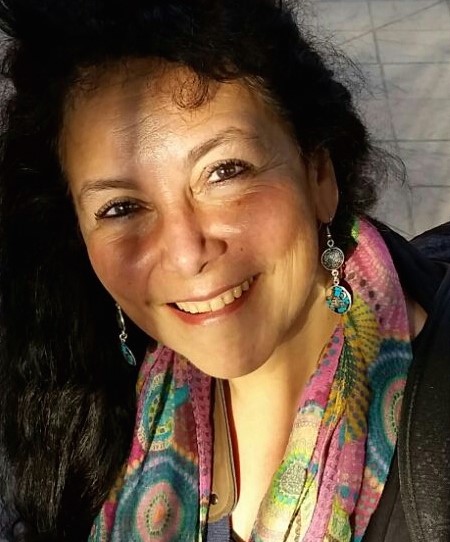 Name
Name
Mabel Encinas-Sanchez
City of origin
Born in Mexico City, based in London
How would you describe your writing and performance style?
My writing is rooted in hope: I believe that this world can be changed, and actually the world changes anyway, but I believe that it can change for the better… and I can contribute to it. So, in both my writing and performance art, I explore the room for hope. My partner takes photos of plants that grow in the cracks of the pavement, or between rocks, and that resonates with my writing. Hope is not a simplistic optimism.
I feel close to concepts such as decolonising, challenging inequalities, interrupting ‘isms’ (in our situations of privilege), listening to children’s voices and many other silenced voices, mutual aid and other ways of working together…
When did you begin writing poetry and why?
I started writing as an adult. Before, I lacked confidence to explore what I needed to say. Poetry came to me, I guess, when I was ready. Like they sometimes say about love: you do not choose poetry, poetry chooses you. Having said that, I believe that we all are potentially poets. Funnily, the first text that I wrote was a short story (and I even sent it to a competition).
What inspires you to write?
Things that I feel strongly, I guess. Issues of power imbalance, about which I feel angry; love for someone or for something that I value; pain, anything that has to do with the place from which I experience the world. In this sense, I think my feelings and emotions are part of doing and thinking in the world.
Funnily, the first text that I wrote was a short story (and I even sent it to a competition).
How has living in London/the UK affected your writing and your career?
I had some very hard years in London (that give you a lot of material, by the way). You lose privileges that you had not realised you had. To say the most obvious, to be in what you call your country and that the rest of the world recognises that you have the right to be there. From a different place, you start discovering another world, and rediscovering your previous world, whatever it was. You also discover what you are, what you were and even your own shortcomings, and what you can be. It is a deep ‘spiritual’ journey, whatever ‘spiritual’ can be for a non-believer.
Water Warriors [excerpt]
by Mabel Encinas
I am a part of every woman
and every woman is a part of me.
Together we are a stream, a river, a thousand seas.
We are the water women
in our shanty towns
in our farms at the top of the hills
When our people are seen as undeserving,
when our rivers are polluted by greed,
when our wells are dried in sadness,
we bring water creating wake-trails,
we bring water, el agüita, offering life and hope
…
We have been wasted water.
Overused.
Undervalued.
Taken for granted.
We can be bitter water,
dirty water, poisoned water,
destructive, sick and sickening.
We have come through a broken dam.
We were enraged for being contained,
and we broke it down pouring outrage.
Then we became boiling water
and transformed into clouds,
into tropical rain crying for Pachamama.
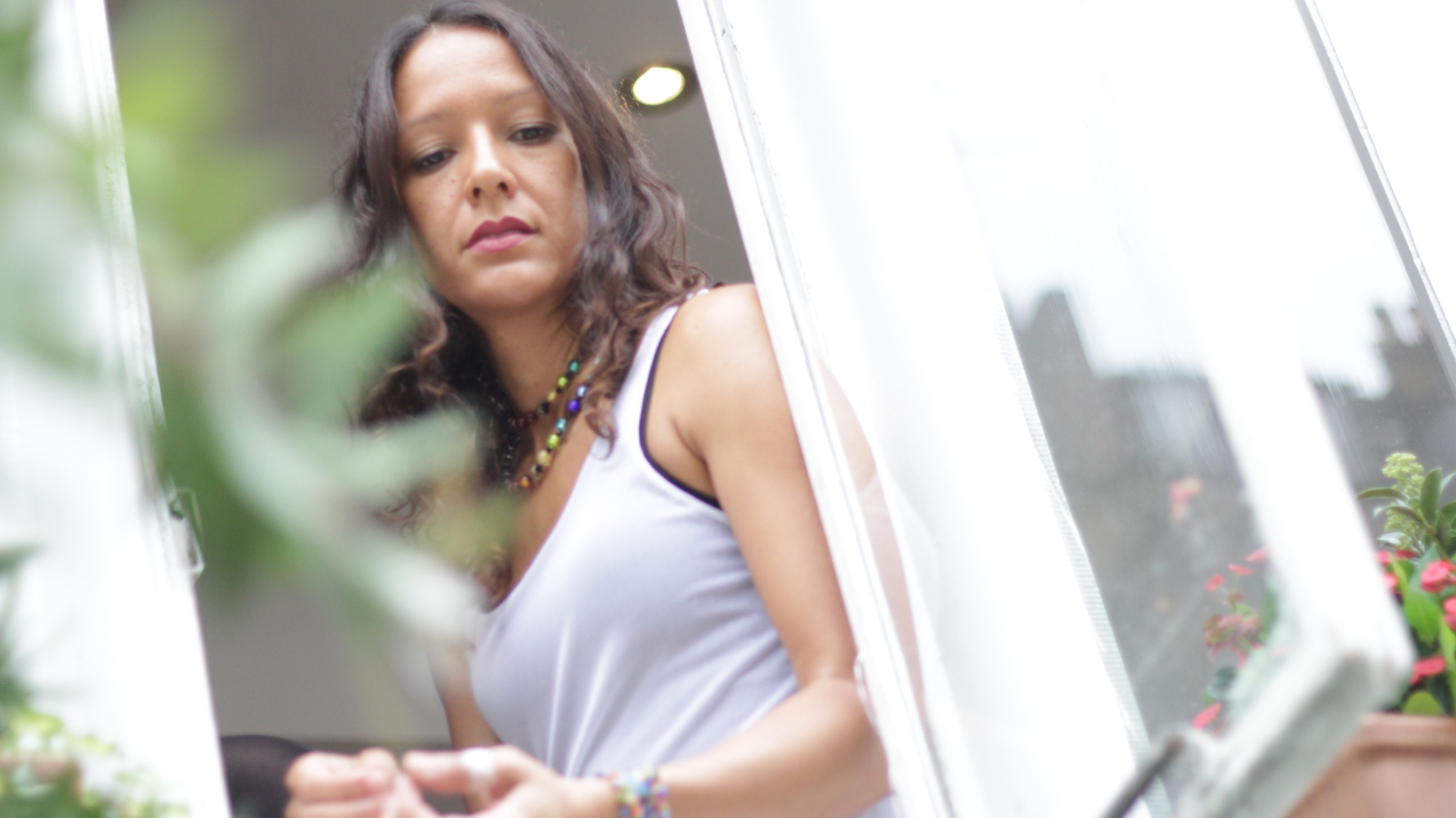
Name
Angélica Quintero. Pen name: Hada Candelaria
City of origin
Guadalajara de Buga, Valle del Cauca, Colombia
How would you describe your writing and performance style?
There are two ways of thinking and feeling that converge into my writing style. I am a statistician and environmental scientist by training and my daily job involves the creation of analytical methodologies to analyse quantitative data. On the other hand, my volunteering job involves working with women in a space of sorority, intuition, healing, spirituality, resilience, peace-building and art. My writing style has thus become prose poetry: a structured prose composition adorned by symbols, metaphors and poetic figures that add cadence and rhythm to the text.
“My performance is something I am still exploring. At the FLAWA festival, there will be a sprinkle of photography, recordings and some reading in English and Spanish.”
When did you begin writing poetry and why?
I always liked writing and it was easy for me to create stories. Back then, my inspiration was driven by passion, literature and stories of Yajé shared and experienced with Rafael de Antigua, my mentor at that time. But as I immersed myself into my career in Statistics, an analytical mind took over my writing and it was only ten years ago that Hada Candelaria was born.
A new fire lighted my writing three years ago with the possibility of contributing to the Colombian peace process, and the subsequent implementation of the final accord. Since then, my work with Colombian women has consolidated and I have had the opportunity to work with Colombian artists committed to using art to express and denounce social issues.
What inspires you to write?
Right now, my inspiration comes from many places, from the hands of my father, from the generosity of my mother, from the female connexion I shared with some of my girl-friends, from so many rituals, from suffering and happiness, to love and sex.
How has living in London/the UK affected your writing and your career?
London is such a multicultural place that it is impossible not to let the city influence your art. London is a place of a continued explosion of artistic expression that can only give us ideas and resources to create and re-create. London is a city that gives you license to be and explore fully who you are.
by Hada Candelaria
She is sexy green eyes and soft pale skin
She is messy collars and beautiful breasts
She is an open rose of tectonic tremors
She is a brave woman born of a scandalous affair and an unpublished story
She is uncountable books and a catty dog she is too
She is a pond in the garden with a wild creeper plant at the door
She is quiet on wooden floors and fire within the shadows of dimly lit rooms
She is delicious flavours served at the yellow table with biblical chairs from the church
She is an African mask on the corridor and a British bath with copper pipes
She is 93 years old and also 38
She is a rest on the floral sofa with a small vintage mirror on the floor
She is an old wooden coat stand hidden under jackets and coats for every season and more
She is a Soviet industrial lamp of light in my life hanging low but covering me all
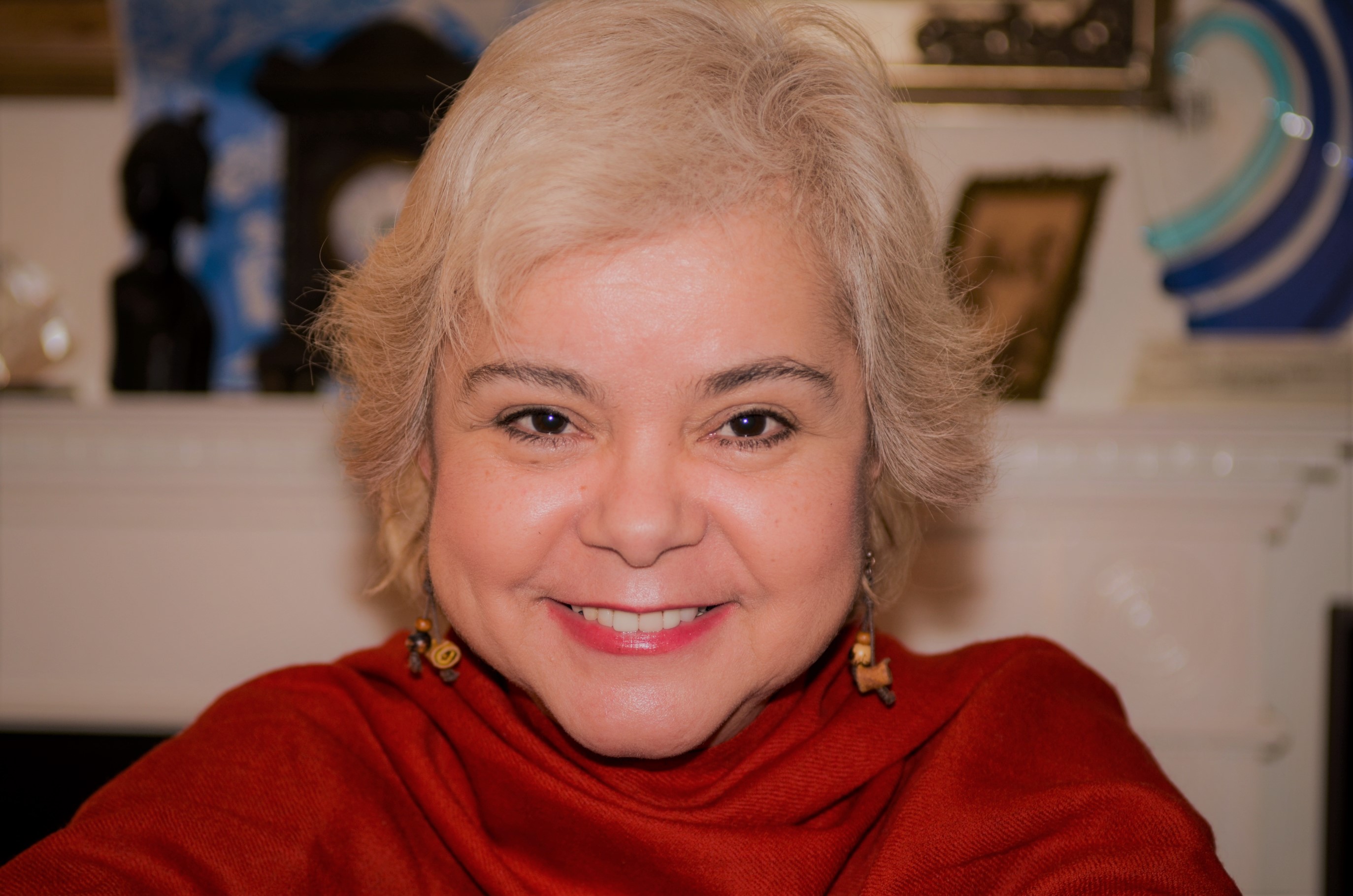 Name
Name
Barbara L. Lopez Cardona
City of origin
Medellin, Colombia
How would you describe your writing and performance style?
I think I have a universal approach in the way I write, it is a free style. What interests me is communication, rather than following any writing rules. I feel the need to talk about social issues, as well as my feelings and emotions about life in general.
When did you begin writing poetry and why?
I’ve written poetry since I was very young, I remember in my school days being asked by my friends to write love poems for their boyfriends, I found great pleasure in doing that. Even though I wasn’t in love at the time, writing about love came very naturally to me.
There’s not a clear ‘why’ to when I started writing, it was something inside me that wanted to come out and pen and paper was the most practical way. Being a shy person writing became the best way of expressing myself.
“I remember in my school days being asked by my friends to write love poems for their boyfriends”
What inspires you to write?
Everything and anything inspires me. Suffering, injustice, the violation of human rights. But I also write about hope and love of course.
How has living in London/the UK affected your writing and your career?
I came to London when I was quite young and I started writing about my experiences in a new country, a new culture and a new language – it was more like a diary than poems really. Later on when I read them I noticed a difference in structure and intention, I didn’t see things as black and white as before, I started to see the rainbow that is life. I cannot say whether it was because of living in London or because I was going into a natural process of growing up as a person. I think my career really started in the UK.
“I think my career really started in the UK.”
The perfect home
by Barbara L. Lopez Cardona
the hut made of mud and hay
no luxuries, no decorations
but a lot of love and family hugs
mum, dad and siblings
different ages, different dreams
but one same purpose…to succeed
even when dreaming of distant lands
full of promises of myrrh and gold
they stayed on their soil
where everything and everybody where known
one thing remained untouchable
the love, the common goal,
that sparkle that connect them all
the simple most fondly believe
of having and sharing the perfect home.
When hunger and war struck
A very painful journey began.
Leaving all behind,
The hay, the mud, the hut
fighting for survival, longing for a place to rest
with no believes, with tears and pain
they took the road of the unknown
they became foreigners in a very hostile world.
Mum, dad and siblings
Had a perfect home no more.

Silvia Rothlisberger’s Literary South radio show (Resonance 104.4FM) connects writers from the Spanish written world with readers and listeners across the UK and works to raise the prominence of writers in Britain from ethnic minority groups.
To hear these fantastic poets perform live, head to Genesis Cinema (93-95 Mile End Road, E1 4UJ)on Saturday 18th May. Event runs 20:00 – 22:30.
Follow Sounds and Colours: Facebook / Twitter / Instagram / Mixcloud / Soundcloud / Bandcamp
Subscribe to the Sounds and Colours Newsletter for regular updates, news and competitions bringing the best of Latin American culture direct to your Inbox.

